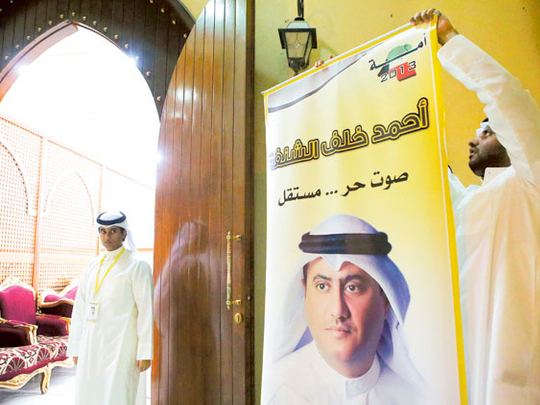
Kuwait City: From boycotting ballots to storming parliament, each time Kuwait heads into parliamentary elections the backstory seems to overshadow the vote.
Yet the revolving-door series of elections could have an impact not only on this tiny, oil-rich state, but also on fellow nations in the Gulf and the rest of the region.
For the election on Saturday to pick a new 50-seat parliament — the most empowered elected political body in the Gulf — there might be another boycott, but the real question is whether the vote will ease the internal pressures on Kuwait’s ruling dynasty.
The challenges come from an emboldened opposition that includes groups ideologically linked to Egypt’s Muslim Brotherhood on the one hand, and on the other, liberals angered by crackdowns such as prison sentences over social media posts.
The main test is whether the election outcome will restore credibility to a political system that appears stuck in a cycle of disputes.
“I think there is not much enthusiasm for the elections in general,” said Sa’ad Bin Tefla, a Kuwaiti professor and political analyst. “Counting the upcoming elections, the people of Kuwait will have gone to the polls three times [since February last year]. It’s humiliating.”
Last December, there was an election boycott by an unusual alliance of Islamists, tribal factions and Western-oriented liberals. Before voting in February 2012, Arab Spring-inspired tensions had grown so high that Kuwait’s ruler disbanded parliament after opposition-led protesters stormed the chamber.
But Kuwait represents the boldest Gulf experiment in permitting political influence outside palace walls.
Kuwait’s ruling family controls all key government positions, yet nowhere else in the Gulf can elected lawmakers block initiatives or question officials, calling in Cabinet ministers for grilling over alleged mismanagement and other issues.
The escalating friction has turned Kuwaiti politics into a complicated web of legal challenges, boycotts and crackdowns over internet posts deemed insulting to the emir, Shaikh Sabah Al Ahmad Al Sabah.
The timing of Saturday’s election underlines the extent of the crisis — holding the vote during the Islamic holy month of Ramadan and its dawn-to-dusk fasting, a rare occurrence in the Muslim world.
The election was called after Kuwait’s top court dissolved parliament in June. But it let stand the emir’s decree changing the voting rules to one vote per person. Previously, each voter was allowed four votes, all for one or for several candidates. Critics claimed that encouraged vote-buying and bolstered clan-run political blocs.
The emir’s edict ignited widespread outrage, spawning street clashes and the formation of another odd alliance of pro-reform liberals and conservative Islamists pledging to sit out the election in protest. Liberals joined the boycott over anger that the emir used a decree to change the voting rules rather than go through parliament.
That is not the only challenge that could escalate after the election.
Rights groups and media watchdogs have stepped up denunciations of Kuwait’s social media clampdowns, part of wider Gulf efforts to punish Twitter users and others for posts considered insulting to rulers. Last week, an appeals court in Kuwait upheld a 20-month sentence against an online activist for “offending” the emir.
On Sunday, New York-based Human Rights Watch denounced the sentence and urged Kuwait to “tolerate this kind of criticism, not persecute people who dare express it.”
Kuwaiti authorities have also targeted opposition figures. In February, a court sentenced three former opposition lawmakers to three years hard labour for insulting the country’s ruler during speeches at political rallies. An appeals court this week overturned the sentences, but Kuwait’s government can still challenge the decision.
Another former lawmaker, Musallam Al Barrak, refused to surrender this spring when a court sentenced him to five years for a speech that accused the emir of pushing Kuwait toward an “autocracy.” The sentence was later dropped on appeal, but his case remains in court. A hearing is set for early September.
Shafeeq Ghabra, a Kuwait-based political science professor, said the new election “postponed inevitable clashes,” but risks remain that opposition groups may stop considering parliament the best place to make their voices heard.
“People will resort to other means if they stop believing in the parliament, and that’s slowly becoming the case,” Ghabra said. “People will resort to their tribes and sects, and this only makes it worse for Kuwait.”











